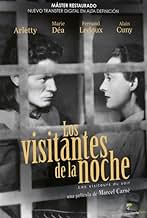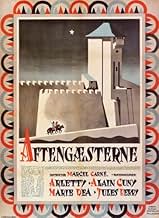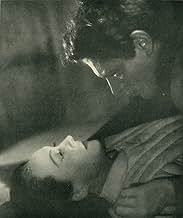Les visiteurs du soir
Dans la France médiévale, le Diable intervient lorsqu'un de ses deux envoyés, envoyé pour séduire et tromper les mortels, tombe plutôt amoureux d'une victime.Dans la France médiévale, le Diable intervient lorsqu'un de ses deux envoyés, envoyé pour séduire et tromper les mortels, tombe plutôt amoureux d'une victime.Dans la France médiévale, le Diable intervient lorsqu'un de ses deux envoyés, envoyé pour séduire et tromper les mortels, tombe plutôt amoureux d'une victime.
- Réalisation
- Scénario
- Casting principal
- Gillaume - Un page
- (non crédité)
- Un page
- (non crédité)
Avis à la une
NB :"Children of paradise " also takes place in another era ,the nineteenth century;sorry.
8.7 / 10 stars
--Zoooma, a Kat Pirate Screener
What makes me really love this movie is the contrast between the very dated conventions of acting, the seemingly slow pace that was the rule at a time the video clips were still waiting in an unforeseeable future and the perfect consistency of the characters and psychology. The emotion is still intact no matter how much the way actors and directors are supposed to convey it has changed over decades.
What a bunch of great actors! True professionals working seamlessly together to serve a masterly written script. I really advise non-french speaking people to watch it in original version with subtitles, to enjoy the music of Prevert's poetic lines.
This movie is a real gem.
France 1485: shady Gilles (square jawed Cuny) and Dominique (worldly wise Arletty) arrive at Baron Hugues castle as melancholic minstrels intent on disrupting the marriage preparations going on – as any self respecting devilish envoy would. Alas it goes awry for Gilles when he actually does fall in love with Anne the Baron's daughter (Dea) but Arletty manages to keep to her usual cynical straight and narrow course, and leads the Baron off his. It's beautifully photographed on black & white nitrate film capturing atmospheric sunny days and romantic arc-moonlit nights, gorgeous costumes and fascinating sets equally well. One can almost smell the fresh air! One slight downer: the three midgets go from startling to plain irritating with their omnipresence. It's all about Love, Honour & Purity poetically and elegantly related – which makes the denouement with the supposedly pure Anne and the for once nonplussed Devil so delightful and droll. Even if out of scope for him he should still have been able to guess that all's fair in love!
Remember: the Devil will always find work for idle hands to do, including his own. Watch it for a thoughtful two hours of breath taking beauty strolling through a lost world as portrayed by another lost world. Next: Les Enfants Du Paradis.
Le saviez-vous
- AnecdotesThis film was shot while the Nazis were occupying France. Its director faced a number of difficulties in making it. It premiered on December 4, 1942. It was one of the biggest film events during the war. It was called "the grandest film of the Occupation." One of the reasons that the film was such a huge success was the rumor that the film was an allegory. Many people saw the character of the Devil as representing Hitler and the continued beating hearts of the lovers as representing France living under German rule. Until his death in 1996 the director, Marcel Carné, denied any intended hidden messages.
- Citations
Dominique - un ménestrel: Men have loved me, as they like to whisper in my ear. I let them. Is it my fault if they wept, gave everything for me, even their lives? The young men were passionate; the old men crawled at my feet.
Gilles - un ménestrel: When did I ever cry or throw myself at your feet?
Dominique - un ménestrel: [snorts] You're different - greedy, stubborn, proud. You just want to be loved, to take without giving, to keep it all and leave.
Gilles - un ménestrel: Like you!
Dominique - un ménestrel: You hunted me like a cat hunts a mouse - but we're both cats, there is no mouse. It's not our fault. We both thought we'd caught a tender new victim... two executioners, face to face and no one to torture. How sad.
- Crédits fousThe opening credits are shown as pages of an illuminated book with a gloved hand turning each page over.
- ConnexionsEdited into Histoire(s) du cinéma: La monnaie de l'absolu (1999)
Meilleurs choix
- How long is The Devil's Envoys?Alimenté par Alexa
Détails
- Durée
- 2h(120 min)
- Couleur
- Rapport de forme
- 1.37 : 1






























